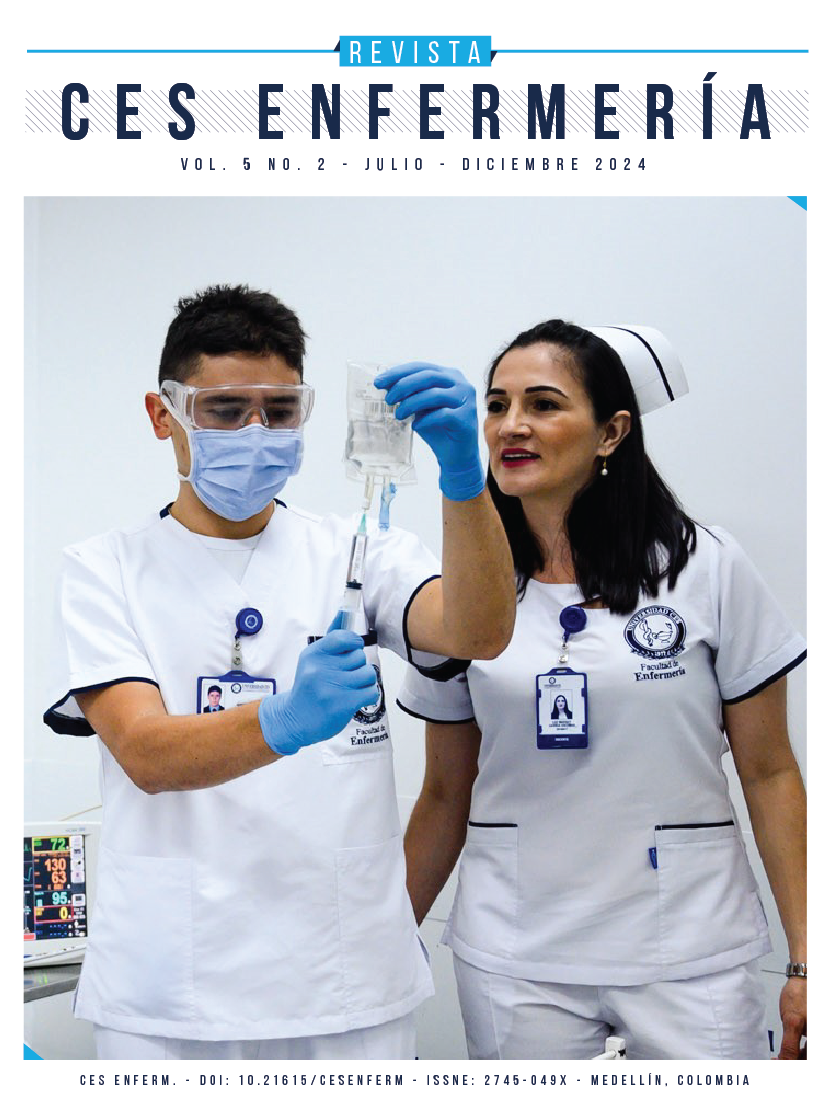Relationship between the habitual consumption of social network services and the mental health of university students
DOI:
https://doi.org/10.21615/cesenferm.7464Keywords:
Online social networks, mental health, students, usersAbstract
Objective: To describe the relationship between the habitual use of social media services and the mental health of university students. Methodology: Descriptive, cross-sectional, and correlational research. The sample included 286 university students from the Faculty of Health Sciences at a university in Montería (Córdoba, Colombia) during 2022. A stratified random sampling method was conducted in two stages. Surveys were applied along with the General Health Questionnaire (GHQ-12). Absolute and relative frequencies, chi-square statistics (p-value at 0.05), and Relative Risk (OR) were estimated. Results: The most used social networks were Instagram and Facebook. Most participants were female (64.3%) and aged between 22 and 24 years (30.4%). About 58% lived in socioeconomic stratum 1, and generally, 56.6% had a family income level between 1 and 3 minimum wages. A relationship was established between the habitual use of social media services and mental health status. GHQ-12 results showed a prevalent measurement of poor mental health (61.5%) and fair mental health (28.7%), while a minority (9.8%) presented an adequate mental health level. Conclusion: A relationship has been demonstrated between the habitual use of social media services and the general mental health status of students. Mental health risk decreases when students use between 1 and 3 social networks (OR: 0.49); meanwhile, participating in 4 or more networks triples this risk (OR: 1.74).
Downloads
References
Rondón M. Salud mental: un problema de salud pública en el Perú. Revista Peruana de Medicina Experimental y Salud Pública. 2021; 23(4):237-238.
Ungar M, Theron L. Resilience and mental health: how multisystemic processes contribute to positive outcomes. The Lancet Psychiatry. 2020; 7(5): 441-448.
Kochuchakkalackal G, Reyes M. An Emerging Mental Health Concern: Risk Factors, Symptoms, and Impact of Internet Gaming Disorder. Journal of Technology in Behavioral Science. 2020; 5: 70-78.
Rodríguez Z. Uso en Internet: su asociación con salud mental en pasantes de Licenciatura en Enfermería en servicio social. San Luis Potosí: Universidad Autónoma de San Luis Potosí; 2018.
Aleksandrova Y, Parusheva S. Social Media Usage Patterns in Higher Education Institutions – An Empirical Study. 2019; 14(5): 108-121.
Marín V, Vega E, Passey D. Determinación del uso problemático de las redes sociales por estudiantes universitarios. Revista Iberoamericana de Educación a Distancia. 2019; 22(2): 135-149..
Gómez M, Matosas L, Ruiz J. Social Networks Use Patterns among University Youth: The Validity and Reliability of an Updated Measurement Instrument. Sustainability. 2020; 12: 3503.
Akbari M, Seydavi M, Palmieri S, Mansueto G, Caselli G, Spada M. Fear of missing out (FoMO) and internet use: A comprehensive systematic review and meta-analysis. Journal of Behavioral Addictions. 2021; 10(4): 879-900.
Casale S, Akbari M, Bocci S, Seydavi M, Fioravant G. Interpersonally-Based Fears and Problematic Social Networking Site Use: The Moderating Role of Online Social Support. Int J Ment Health Addiction. 2022; 1-13.
Masthi NR, Pruthvi S, Phaneendra MS. A comparative study on social media usage and health status among students studying in pre-university colleges of urban Bengaluru. Indian J Community Med. 2018; 43: 180-184.
Baños J. Uso de Redes Sociales y Sintomatología Depresiva en Estudiantes Universitarios. Eureka. 2020; 17(2): 293-308.
Zhang M, Sun X, Qin X, Ren X, Wen C, Xie F, Chen B, Dai Q. Problematic utilization of online social networking site in Chinese college students: prediction of personality and dynamic mediators. Curr Psychol. 2022: 1-17.
Abi-Jaoude E, Naylor E, Pignatiello A. Smartphones, social media use and youth mental health. Canadian Medical Association Journal. 2020; 192: E136-E141.
Smith A, Doe J. Impact of social media on youth mental health: nursing interventions. J Nurs Pract. 2022: 139-149.
Johnson L. Promoting mental health in the digital age: a nursing perspective. Nurs Times. 2021; 1-4.
Downloads
Published
How to Cite
Issue
Section
License
Copyright (c) 2024 CES Enfermería

This work is licensed under a Creative Commons Attribution-NonCommercial-ShareAlike 4.0 International License.



